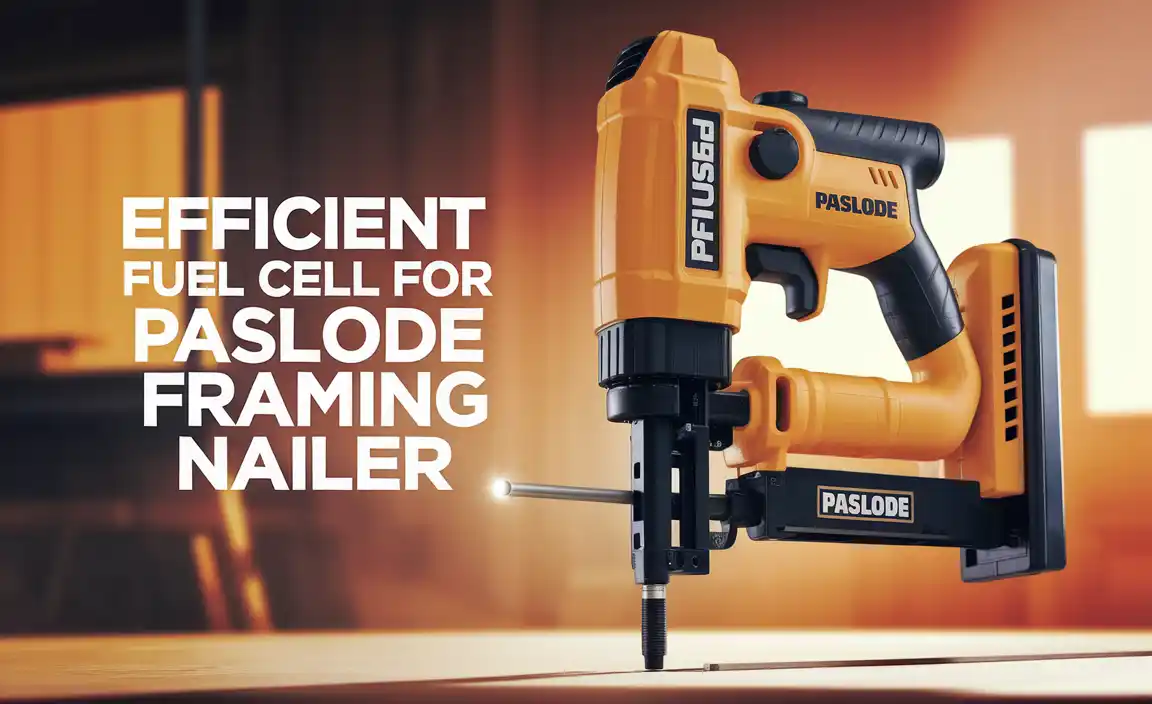Quick Summary: Navigating nailer compatibility is straightforward! Focus on nail gauge and collation type for specific brands like DeWalt, Bostitch, Senco, and Paslode. Understanding these basics ensures you grab the right nails for your project, saving you time and frustration.
Hey there, fellow DIYers and woodworking enthusiasts! Jack Shaffer here, from Nailerguy. Ever found yourself staring at a wall of nail boxes, completely unsure which ones will actually fit your trusty nailer? It’s a common hiccup, especially when you’re just starting out or trying a new tool. You grab what looks right, only to find out it jams your nailer or, worse, doesn’t even fit! This can put a real dampener on your project plans. But don’t worry, we’re going to clear the air and make nailer compatibility super simple. By the end of this guide, you’ll be confidently choosing the right nails for your tool, every single time. Let’s dive in and get your projects firing on all cylinders!
Table of Contents
Understanding Nailer Compatibility: It’s All About the Nails!
When we talk about nailer compatibility, it really boils down to two main things: the type of nail and the size of the nail. Think of it like trying to fit a square peg in a round hole – if the nail isn’t the right shape or size for the magazine and firing mechanism of your nailer, it just won’t work. Thankfully, most nail manufacturers stick to industry standards for common nail types and sizes. This means that a 15-gauge finish nail from one reputable brand will likely work in another reputable brand’s nailer designed for 15-gauge nails.
The key is to know your nailer’s specifications. Does it take brad nails (18-gauge)? Finish nails (16-gauge or 15-gauge)? Or perhaps framing nails (common gauge, like 8d or 10d)? Once you know the gauge and the collation type (how the nails are held together in strips), you’re most of the way there. We’ll break down what “gauge” and “collation” mean in a moment. The goal is to make sure that when you head to the hardware store or click “add to cart” online, you walk away with what you need, not a box of frustration.
Nail Gauge: The “Thickness” of the Nail
The “gauge” of a nail refers to its thickness. This might sound a bit backward, but a lower gauge number means a thicker nail, and a higher gauge number means a thinner nail. This is a standard measurement used across the board, and it’s crucial for compatibility.
- 18-Gauge (Brad Nails): These are very thin nails with small heads. They’re perfect for delicate trim work, small craft projects, and anywhere you want minimal visibility of the nail head. They don’t offer a lot of holding power but are fantastic for aesthetics.
- 16-Gauge (Finish Nails): A step up in thickness from brad nails. These are great for attaching baseboards, crown molding, window and door casing, and other trim pieces where you need a bit more holding power but still want the nail head to be relatively small and easy to conceal.
- 15-Gauge (Fencing/Angled Finish Nails): These are slightly thicker than 16-gauge and often come with a slight angle to the strip (more on that in collation). They offer good holding power and are excellent for thicker trim, exterior trim, and applications where you might need to drive nails at an angle.
- Common Gauges (Framing Nails): These are much thicker nails, often referred to by their “penny” size (like 8d, 10d, 16d). They are used for structural framing, building decks, fences, and other heavy-duty construction. Their gauges vary, but they are significantly thicker than finish or brad nails.
Using the wrong gauge nail can lead to several problems. Too thin of a nail might bend or fail to drive properly, while too thick a nail might not fit into the nailer’s magazine, could damage the tool, or might even split your wood. Always check the manual for your specific nailer to confirm the acceptable nail gauges.
Collation Type: How the Nails Are Held Together
Collation refers to the method used to hold the nails together in a strip or coil. The angle of the collation and the material used to join them are important for how they feed into your nailer. Common collation types include:
- Straight Collated Nails: These nails are held in a straight strip, usually with either a paper or plastic coating. The angle of the glue or paper strip can vary (e.g., 20°, 21°, 22°, 25°, 30°). This is a very common type for finish and brad nailers.
- D-Head Nails: A specific type of nail head that’s shaped like a flattened “D.” These are used in nailers that accept them to allow for denser nail placement in certain applications.
- Offset Nail Heads: Similar to D-head, these nail heads are slightly offset to allow for more nails in the strip.
- Round Head Nails: Typically used for framing nails, these have a full, round head.
- Plastic-Collated Nails: Nails are held together with plastic. These are often used for framing and heavier-duty applications and, importantly, they tend to be more resistant to moisture than paper-collated nails.
- Wire Collated or Tape Collated: Nails are joined by wire or tape, often at an angle. These are very common for framing nailers.
- Coiled Nails: Nails are supplied in a coil, typically used in roofing nailers and some siding nailers.
The angle of the collation is critical. A nailer designed for 21° plastic-collated framing nails won’t accept 20° paper-collated framing nails, and certainly not a 15° angled finish nail strip. Referring to your nailer’s manual will tell you exactly what collation degree and type it requires. Brands often specify this clearly on their nailer and the nail packaging.
Essential Nailer Brands and What to Look For
When you’re buying a nailer or nails, you’ll encounter several major brands. While each brand might have proprietary features, they generally adhere to industry standards for their nail types. The key is to match the nail’s specifications (gauge and collation) to what your nailer requires, regardless of the brand.
1. DeWalt Nailers and Nails
DeWalt is a powerhouse in the power tool industry, known for its durable and reliable tools, including a wide range of pneumatic and cordless nailers.
- Nailer Types: DeWalt offers pneumatic and cordless nailers for framing, finishing, brad nailing, staple guns, and more.
- Compatibility Focus: DeWalt nailers are designed to accept standard nail gauges and collation types. For example, their 16-gauge finish nailers typically accept drives nails that are 1.5mm to 1.6mm in diameter and are often designed for straight collated nails. Their cordless models, especially the Xtreme™ line, are engineered for specific Paslode-compatible nails or their own branded versions.
- What to Look For: Always check the nailer’s specifications for the required gauge (e.g., 16ga, 18ga) and collation type (e.g., straight, 15°, 21°). DeWalt also sells its own branded nails that are guaranteed to be compatible with their tools.
2. Bostitch Nailers and Nails
Bostitch has a long history, particularly in the construction and framing nailer market. They are known for robust tools that can handle tough jobs.
- Nailer Types: Bostitch is very strong in framing, roofing, and construction nailers, but they also offer excellent finish, brad, and micro-brad nailers.
- Compatibility Focus: Bostitch uses industry-standard nail sizes. Their framing nailers often accept 20° or 21° wire or plastic collated nails. Their finish nailers will accept standard 16-gauge straight collation nails (often 1” to 2.5” length), and their brad nailers take 18-gauge straight collation nails.
- What to Look For: If you have a Bostitch nailer, look for nails specified for “Bostitch” or more importantly, for the exact gauge and angle. A quick look at the Bostitch website or the tool’s manual will clarify their compatibility for a specific model.
3. Senco Nailers and Nails
Senco is another prominent name, often considered a leader in pneumatic tools for professional contractors, but also very accessible for DIYers. They pride themselves on precision and performance.
- Nailer Types: Senco offers a comprehensive line including framing, finishing, brad, roofing, insulation, and upholstery nailers.
- Compatibility Focus: Senco nails are designed to work seamlessly with Senco nailers. Their 15-gauge finish nailers, for example, are built for specific 15-gauge nails. They often specify collation types like “straight collation” for finish nailers and “21° plastic collation” for framing nailers.
- What to Look For: When purchasing Senco nails, match the gauge (e.g., 15GA, 18GA) and collation type exactly. Senco’s website has a wealth of information, often with cross-reference guides for their nails.
4. Paslode Nailers and Nails
Paslode is a well-known brand, especially for its cordless gas-powered and pneumatic nailers. They are often favored for their innovative technology and power.
- Nailer Types: Paslode excels in cordless framing, finishing, and roofing nailers, alongside their pneumatic range.
- Compatibility Focus: Paslode’s cordless nailers, in particular, are often designed to use specific Paslode fuel cells and nails. While their pneumatic tools accept standard nails, it’s crucial to ensure you’re getting nails that feed correctly and fit the magazine dimensions. For their cordless framing nailers, they often use 2° to 5° angled nails that are specific to their systems.
- What to Look For: For Paslode cordless tools, it’s generally best to use Paslode branded nails and fuel cells for guaranteed performance and to maintain tool warranty. For their pneumatic tools, standard gauge and collation compatibility apply, but always double-check the manual.
Other Reputable Brands and General Advice
Beyond these major players, other excellent brands include:
- Hitachi (now HiKOKI): Known for reliable pneumatic and cordless tools. They follow standard gauge and collation practices.
- Grip-Rite: Offers a wide variety of fasteners for many brands of nailers.
- Arrow Fastener: Particularly strong in staplers but also offers nailers and associated nails.
General Advice: The most critical step, regardless of brand, is to always consult your nailer’s owner’s manual. It will explicitly state the required nail gauge, length range, and collation type (including the angle and material if applicable). If you can’t find your manual, a quick search online for “[Your Nailer Model] manual PDF” often yields results.
Compatibility Tables for Common Nailer Types
To help you visualize, here are some common nailer types and the nail specifications they typically use. Remember, these are general guidelines; always verify with your specific tool’s manual!
Table 1: Finish and Brad Nailer Compatibility
| Nailer Type | Common Gauge | Nail Diameter (Approx.) | Collation Type | Typical Applications |
|---|---|---|---|---|
| 18-Gauge Brad Nailer | 18 GA | 1.0 mm – 1.2 mm | Straight Collated (Paper or Plastic) | Small trim, delicate moldings, craft projects, paneling. |
| 16-Gauge Finish Nailer | 16 GA | 1.4 mm – 1.6 mm | Straight Collated (Paper or Plastic) | Baseboards, door/window casing, crown molding, chair rails. |
| 15-Gauge Angled Finish Nailer | 15 GA | 1.7 mm – 1.8 mm | Angled Straight Collated (Paper or Plastic), often 20°-34° | Thicker trim, exterior trim, cabinets, situations needing angled access. |
| 18-Gauge Panel Nailer | 18 GA | 1.0 mm – 1.2 mm | Straight Collated (Paper or Plastic) | Attaching thin panels, jigs, small cabinet parts. |
Table 2: Framing and Construction Nailer Compatibility
| Nailer Type | Common Gauge | Nail Diameter (Approx.) | Collation Type | Typical Applications |
|---|---|---|---|---|
| Nailer Type | Common Gauge | Nail Diameter (Approx.) | Collation Type | Typical Applications |
| Framing Nailer (Coil) | Common Gauges (#6 to #9, often referred to by penny size like 8d, 10d) | 2.3 mm – 3.8 mm | Wire or Plastic Collated Coil (often flat or slightly angled) | House framing, decks, fences, sheds, general construction. |
| Framing Nailer (Stick) | Common Gauges (#6 to #9, often referred to by penny size like 8d, 10d) | 2.3 mm – 3.8 mm | Plastic Collated Stick (21°, 28°, 30°, 34° angles) | House framing, decks, fences, sheds, general construction where stick magazine is preferred. |
| Roofing Nailer | Common Gauges (#1 to #4, often referred to by penny size related to cap nails) | 2.4 mm – 3.3 mm | Coiled, Wire or Plastic Collated (Flat) | Shingling, roofing felt, house wrap. |
| Siding Nailer | Common Gauges (14 GA or 15 GA) | 1.6 mm – 1.8 mm | Plastic Collated Stick or Coil (often angled) | Vinyl siding, wood siding, fiber cement siding. |
Understanding these tables can be a great starting point. For instance, if your nailer is a Bostitch 16-gauge finish nailer, you’d look for 16-gauge nails, typically a length between 1″ and 2.5″, and that they are straight collated. You could then look for Bostitch brand nails, but you could also likely use Senco, DeWalt, or Grip-Rite nails that meet the same specifications.
When Only Brand-Specific Nails Will Do (and Why)
While most nailers are designed to accept standard fasteners, there are a few scenarios where sticking to the brand’s recommended nails is highly advisable, if not mandatory. This is particularly true for cordless tools that combine a power source with a nail firing mechanism.
Cordless Nailers and Fuel Cells
Many cordless nailers, especially those using gas fuel cells (like many Paslode models), require specific Paslode fuel cells and nails. These systems are engineered to work together. The fuel cell provides the power to drive the nail, and the nail itself is designed to interact correctly with the firing pin and the combustion process within the tool.
Using non-Paslode fuel cells or nails in a Paslode cordless nailer can lead to:
- Poor Performance: Nails might not drive fully, or the tool might misfire.
- Tool Damage: Improper combustion or nail interaction can potentially damage internal components.
- Voided Warranty: Manufacturers often stipulate that only their proprietary consumables be used. Using others can void your tool’s warranty.
Similarly, other brands offering cordless, battery-powered nailers (like DeWalt’s 18V models) have internal mechanisms designed to work with their specific nail strips. While they often accept standard gauge and collation types, the exact dimensions and coatings of their branded nails might offer the most reliable feeding and driving.
Specialty Nailers
Some highly specialized nailers might also have unique fastener requirements. For example, micro-brad



